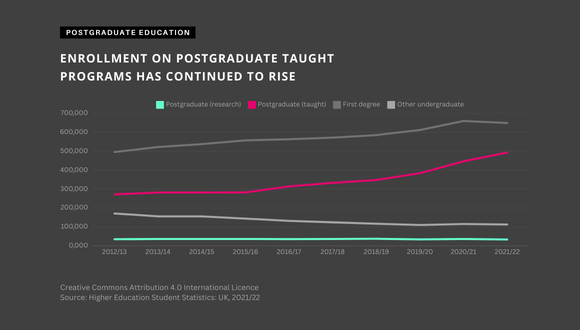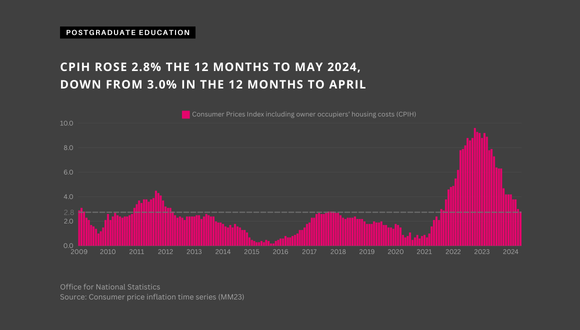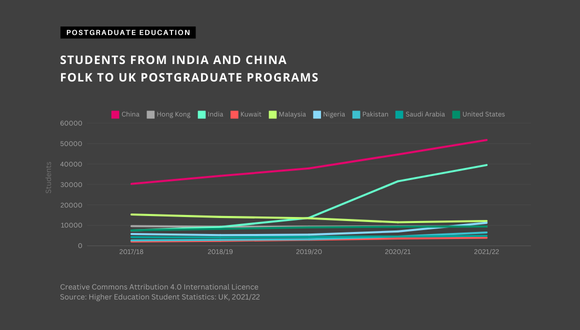Wed, 19 June, 2024
What have been the biggest changes to the postgraduate education landscape in the UK since 2009?
From the expansion of programs and delivery modes to the impact of Brexit and the changing landscape of funding, the changes to postgraduate education in the UK from 2009 to 2024 has been nothing short of remarkable.
In this article, we take a closer look at the transformations that have shaped the education environment for postgraduate students. The insights and developments presented here provide a valuable understanding of the evolving world of postgraduate education.
Wider Range of Programs and Specializations
Compared to 2009, the postgraduate programs in the UK in 2024 offer a greater number of specializations, catering to diverse academic interests and career aspirations. Traditional subjects such as business, engineering, and natural sciences have been supplemented with niche areas like cybersecurity and data analytics, along with interdisciplinary studies. This expansion provides students with more options to pursue their academic and professional goals.
Shift in Delivery Modes
The COVID-19 pandemic accelerated a remarkable transformation in the delivery modes of postgraduate education. While in 2009, in-person classroom instruction dominated the landscape, the advancements in technology and the need for social distancing propelled the widespread adoption of online and blended learning formats. This shift has provided students with greater flexibility to manage their studies alongside other commitments, marking a significant departure from the traditional approach to postgraduate education delivery.

Emphasis on Research and Industry Collaboration
In 2024, there is a stronger emphasis on fostering partnerships between academic institutions and industry stakeholders. This has resulted in increased opportunities for postgraduate students to engage in applied research projects, internships, and industry placements, allowing them to gain practical experience and contribute to real-world challenges.
Such collaborations underscore the growing importance of real-world applicability and industry integration in postgraduate education.
NSIRC opened its doors 2012 after a call from the UK Government for research that responds to the needs of industry. Founded by TWI, BP and the Lloyd's Register Foundation, the centre continues to unite academia and industry, working closely with lead academic partner Brunel University London as well as more than 50 respected universities in the UK and around the world.
Increased Focus on Employability and Skills Development
Postgraduate education in 2024 places a greater emphasis on equipping students with the necessary skills and knowledge to succeed in their chosen fields upon graduation. Tailored career development programs, entrepreneurship support, and mentorship opportunities are becoming integral parts of the postgraduate learning experience. Moreover, there is a growing recognition of the importance of transferable skills such as leadership, communication, and critical thinking, reflecting the evolving demands of the job market.

Fees, Funding and the Rising Cost of Living
A notable change since 2009 is the enhanced accessibility to funding and financial support for postgraduate students in the UK. In 2024, there are more scholarships, bursaries, and funding options available, aimed at reducing the financial barriers associated with pursuing postgraduate education. Initiatives to support underrepresented groups and promote diversity in postgraduate programs have also emerged, ensuring that individuals from varied backgrounds can access these opportunities.
The effect of a weak Pound on international student numbers in the UK can be significant. A weaker Pound can make studying in the UK more affordable for international students, as their home currency can go further. This can lead to an increase in the number of international students choosing to study in the UK, as the cost of tuition, accommodation, and living expenses become relatively cheaper. Conversely, a stronger Pound can have the opposite effect, potentially deterring some international students due to the increased costs associated with studying in the UK. Overall, the exchange rate of the Pound can play a notable role in shaping the number of international students who choose to pursue their education in the UK.
The rising cost of living is a significant concern for postgraduate students, impacting their overall financial well-being. As living expenses continue to increase, students often face challenges in managing their budgets while pursuing advanced education. Many students struggle to afford accommodation, transportation, and daily necessities, leading to financial stress and impacting their overall academic experience.
Additionally, the rising cost of living can influence postgraduate students' career choices and post-graduation plans. The pressure to secure well-paying jobs to cover debt and living expenses may prompt students to prioritize financial stability over pursuing their desired career paths or further academic pursuits. This financial burden can also affect mental health and well-being, creating obstacles for students as they strive to succeed in their academic and professional endeavors.
Since 2022, several factors have significantly impacted the consumer price index (CPI). One of the primary drivers has been the global supply chain disruptions, which have led to shortages of key materials and components, subsequently driving up prices for consumer goods. Additionally, increased energy costs and transportation expenses have played a substantial role in elevating the CPI. Furthermore, shifts in consumer demand patterns during the pandemic and subsequent recovery have also influenced price levels across various sectors, contributing to fluctuations in the CPI. These combined factors have brought about notable changes in the overall cost of living, affecting students and universities alike, and re-shaping economic trends.
Impact of Brexit
The effect of Brexit on postgraduate education remains a topic of significant interest. Concerns have been raised about the potential impact on funding, fees, and access to research opportunities.
However, the full extent of the impact is still unfolding, and ongoing developments in policies and regulations will continue to shape the postgraduate education landscape. International collaborations and partnerships may become increasingly important to mitigate any potential challenges and ensure continued access to high-quality postgraduate education opportunities.

The years from 2009 to 2024 has seen remarkable transformations in postgraduate education in the UK, creating a more flexible, and career-oriented environment for students. As the field of higher education continues to evolve, it is essential for prospective postgraduate students to stay informed about these developments and adapt to the changing opportunities in the pursuit of their educational and professional aspirations.
The evolution of postgraduate education in the UK reaffirms the need for increasing synergy between academia and industry, emphasizing the practical application of knowledge in real-world settings. As the boundaries between theoretical learning and practical experience continue to diminish, there is no better time to explore the dynamic opportunities presented by industry-led academic research. NSIRC stands as a prime example of successful collaboration between academic institutions and industry partners, offering a platform for cutting-edge research and hands-on industry engagement.
To delve into the realm of industry-driven academic research and discover the boundless possibilities it holds for your academic and professional growth, consider reaching out to NSIRC and embarking on a journey of innovation and collaboration.